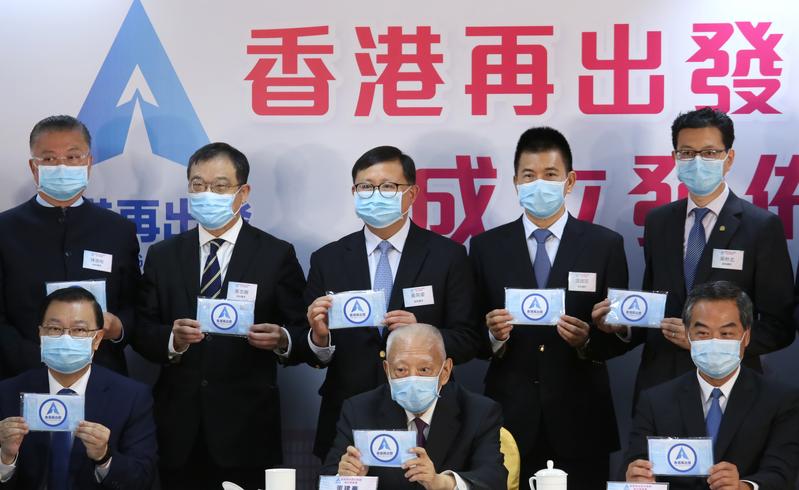 Tung Chee-hwa (center) and Leung Chun-ying (right), both vice-chairmen of the National Committee of the Chinese People’s Political Consultative Conference and co-conveners of the Hong Kong Coalition, take a group photo with guests of honor at the coalition’s inauguration ceremony in Central, Hong Kong on Tuesday. (PARKER ZHENG / CHINA DAILY)
Tung Chee-hwa (center) and Leung Chun-ying (right), both vice-chairmen of the National Committee of the Chinese People’s Political Consultative Conference and co-conveners of the Hong Kong Coalition, take a group photo with guests of honor at the coalition’s inauguration ceremony in Central, Hong Kong on Tuesday. (PARKER ZHENG / CHINA DAILY)
A grand alliance convened by former Hong Kong chief executives Tung Chee-hwa and Leung Chun-ying was launched on Tuesday to assist the government in invigorating Hong Kong’s battered economy, and tackling the city’s social and political challenges.
At its inauguration, the 1,545-member Hong Kong Coalition, which includes some of the biggest names in local politics and business, vowed to help get the crisis-plagued city off to a fresh start, and its economy out of the doldrums.
The members include prominent figures from across Hong Kong, such as National People’s Congress Standing Committee member Tam Yiu-chung, tycoons Li Ka-shing and Lee Shau-kee, and Charles Li Xiaojia, chief executive of Hong Kong Exchanges and Clearing
Bruised by last year’s social unrest and the coronavirus pandemic, the local economy reported on Monday an almost 9 percent year-on-year slump in the first quarter — the steepest on record.
The members include prominent figures from across Hong Kong, such as National People’s Congress Standing Committee member Tam Yiu-chung, tycoons Li Ka-shing and Lee Shau-kee, and Charles Li Xiaojia, chief executive of Hong Kong Exchanges and Clearing. There’re also university heads, legal experts, former government officials, youth leaders and people from the grassroots.
The alliance appealed for unity as the city remains locked in a political impasse, with the Legislative Council’s operations nearly crippled for more than six months amid persistent filibusters by opposition lawmakers.
It pledged full support for the SAR government in its “full, accurate and continued” implementation of “one country, two systems”.
Addressing the inauguration ceremony, Tung, the SAR’s first chief executive, said there’s a consensus among Hong Kong people that the “one country, two systems” framework is the city’s biggest advantage.
The central government has never wavered in adhering to the principle, said Tung, who is now vice-chairman of the Chinese People’s Political Consultative Conference National Committee.
The coalition was founded with the goal of giving full play to the advantages ensured by “one country, two systems”, pooling the strength and wisdom of Hong Kong people, and reviving the city, he said. Hong Kong is at the crossroads, in desperate need of a new direction to start afresh, he added.
Hong Kong has suffered triple blows from the pandemic, economic recession and the continued political wrangling, Tung said. It’s being exploited by violent and hostile rioters and foreign forces aimed at tearing the city apart, he added.
He cited the relentless filibusters by opposition legislators in LegCo, months-long protest violence and persistent physical and media attacks on the Hong Kong Police Force.
Such acts have seriously undermined and challenged the bottom line of the Basic Law, and “one country, two systems”, Tung said.
He said unity is Hong Kong’s top priority in trying to recover from the crisis, and called for concerted efforts to reject violence.
His remarks echoed Chief Executive Carrie Lam Cheng Yuet-ngor, who said in a memo to the coalition that she hopes the city can stand united.
At the ceremony, Leung, also vice-chairman of the CPPCC National Committee, stressed that only by making the most of “one country, two systems” can Hong Kong sustain its prosperity and stability.
Luo Huining, director of the Liaison Office of the Central People’s Government in the HKSAR, said in a message to the alliance that upholding “one country, two systems” is central to the city’s prosperity and stability.
Also at the ceremony were the coalition’s Secretary-General Tam Yiu-chung and 11 deputy secretaries-general, including Maria Tam Wai-chu, a member of the Basic Law Committee under the NPC Standing Committee.


